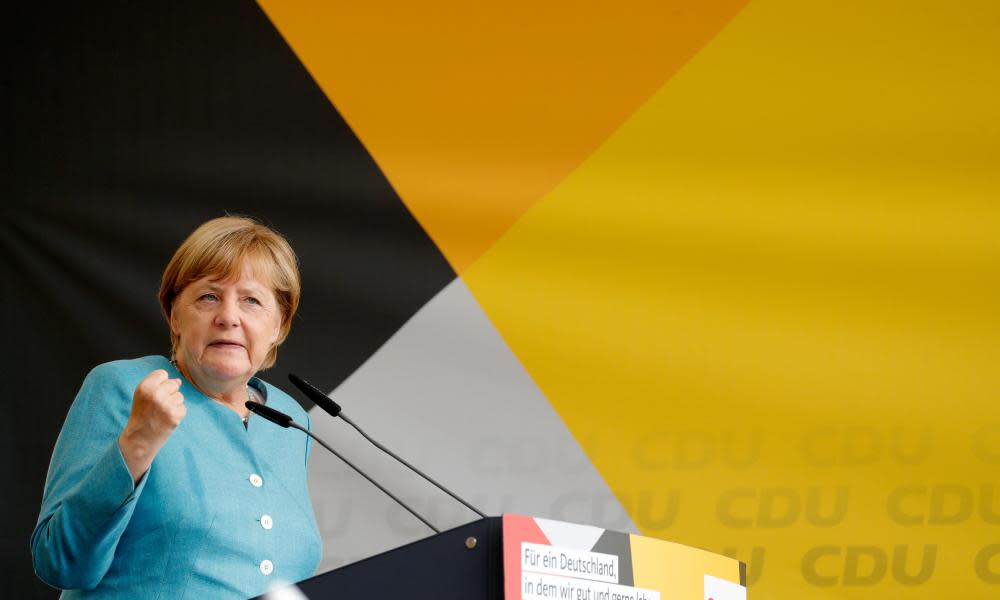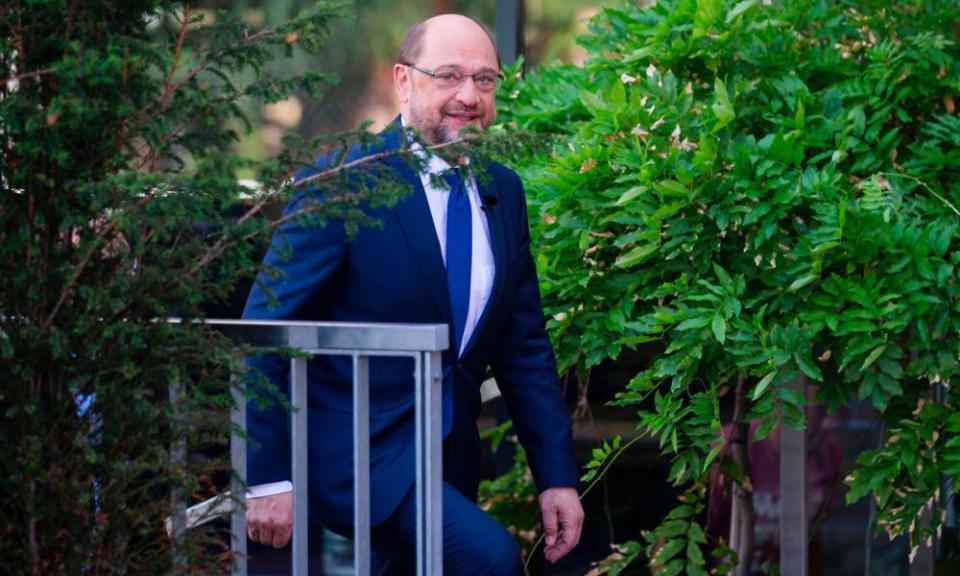Angela Merkel’s most daunting opponent is complacency | Martin Kettle

You would hardly know this is general election year in Germany. I have travelled to Europe’s most important country three times this year, and each time to a very different part of it – first to Hamburg in the north, then to the flatlands of Brandenburg in the far east and, most recently, to prosperous Bavaria in the south. Yet until this week, when the campaign eased into gear, you would have struggled to realise that Europe’s most pivotal political contest is imminent.
So far, this has suited Angela Merkel just fine. It says a lot about the chancellor’s approach to the 24 September German election that she has just spent three weeks doing exactly what she likes doing each summer, election or not. First a visit to the first night of the Wagner family’s Bayreuth festival, then a walking holiday in northern Italy (the German-speaking part), in which she and her husband stayed in the same room in the same hotel in the same village as they always do.
Business as usual is key to Merkel’s political approach too. In her massively effective low-key way, she tries to exude the impression that she is too busy running the country to campaign much. And as she bids for a fourth consecutive term next month, an achievement that would put her into joint second place (along with the late Helmut Kohl) as Germany’s longest serving leader since Bismarck, she has often seemed anxious to calm down an already dull contest still further.
It is tempting to portray the 2017 German election as a foregone conclusion and thus also as the standout exception from a succession of recent elections in Europe and North America in which the forces of change have often dominated the forces of more-of-the-same. The current polls broadly reinforce that picture, showing Merkel’s centre-right CDU and its Bavarian CSU ally with around a 15-point lead over the nearest challenger, Martin Schulz’s centre-left SPD. But the contest is not a foregone conclusion, and Germany’s exceptionalism is not as impervious as it sometimes appears either.
The polls have looked increasingly better for the CDU since March, when Schulz’s return from the European parliament to lead the SPD seemed briefly to have put the two parties neck and neck. It has been four months since then, however, and the Schulz effect has long faded. The SPD has lost two states at the ballot box this year and has just lost its majority in a third, Lower Saxony. Increasingly the only question in German politics has been the shape of the coalition government that Merkel will lead after 24 September.
Here, though, is one of the many ways in which the 2017 context may not be as much of a done deal as it may seem at first sight. In the most recent polls, an unprecedented six parties are in line to clear the 5% threshold that allows them seats in the Bundestag. The four smaller parties – the leftist Die Linke, the liberal FDP, the Greens and the anti-EU AfD – are currently in a photo finish for the makeweight places. All four of them are polling 8-9% at present. If Merkel’s party comes in on around 40% of votes and seats, she therefore faces some big choices in coalition building.

At present, Germany is governed by a “grand coalition” of the CDU and SPD. Neither party wants that to continue after September – though they may be forced back together by the results. Merkel would prefer to work with the FDP, with whom she governed in her second term from 2009. But the FDP may not have enough votes in a six-party Bundestag to give the CDU a majority. In those circumstances, Merkel might also look to the Greens to join the FDP in a three-party “Jamaica” pact (so called because the parties’ colours, black, yellow and green, are those of the Caribbean country’s flag). Such a pact has existed since June in the Schleswig-Holstein region, so there is a precedent.
So it really matters not just how the two big parties do on the day, but how the four smaller ones do too. If the AfD can overcome its current internal battles (former leader Frauke Petry may be facing prosecution for perjury by then) and squeeze both the CDU and the small parties, it may push towards the 10% that would make it theoretically a potential coalition partner. The staunchly pro-European Merkel is not going to do a deal with AfD, but a good AfD showing (the party has never sat in the Bundestag before) would put any new coalition under pressure in some ways reminiscent of Ukip’s impact in Britain 2015.
That is just one way in which Merkel’s fourth term may prove much more difficult, assuming it happens, then even the current one, which has been dominated by rocky issues such as migration, Russia, Brexit and, latterly, Donald Trump. Economically, Germany is prospering, with GDP now rising at its fastest annual rate, 2.1%, since 2014, a budget surplus and unemployment at the lowest since reunification. This is a nice cushion for Merkel as she heads into the elections.
The political class says little about migration, which rocked the country two summers ago, but the issue remains potent
Yet Germany faces wrenching issues that have not featured much in public debate. The political class says little about migration, which rocked the country two summers ago, but the issue remains potent. France’s push to integrate the eurozone finds sympathetic ears across Germany’s governing class, but a strong AfD vote might cause Berlin to stall. Merkel’s pledge to raise defence spending is highly controversial in a country that remains leery about military commitments. The car industry has not recovered from the diesel crisis and almost every week brings fresh scandal about cartels between the leading manufacturers. Meanwhile, in one of Europe’s most rapidly ageing societies, Merkel’s decision to cut the retirement age puts heavier tax pressure on younger workers.
Unlike Britain, Germany is not a country in which the press and politicians are constantly looking to create divisions and to inflame emotions. In general, Germany is much the better for it. Germany remains a social market economy with strong liberal internationalist, decentralising and socially cohesive values. In Germany, young people vote for Merkel not Schulz. Germany is the living contradiction of claims that liberal democratic values and forms of political centrism are either dead or discredited.
Yet there is no getting away from the truth that the German political class can be very complacent. And the history of fourth-term political leaders is not a happy one. Even Kohl, with the mantle of national reunification on his shoulders, became extremely unpopular in his final phase in power. Germans have shown tremendous faith in Mutti – mummy – as Merkel is sometimes known, but she is getting towards her Grossmutti years now, and even Germans may become impatient for a break before 2021.

 Yahoo News
Yahoo News 
